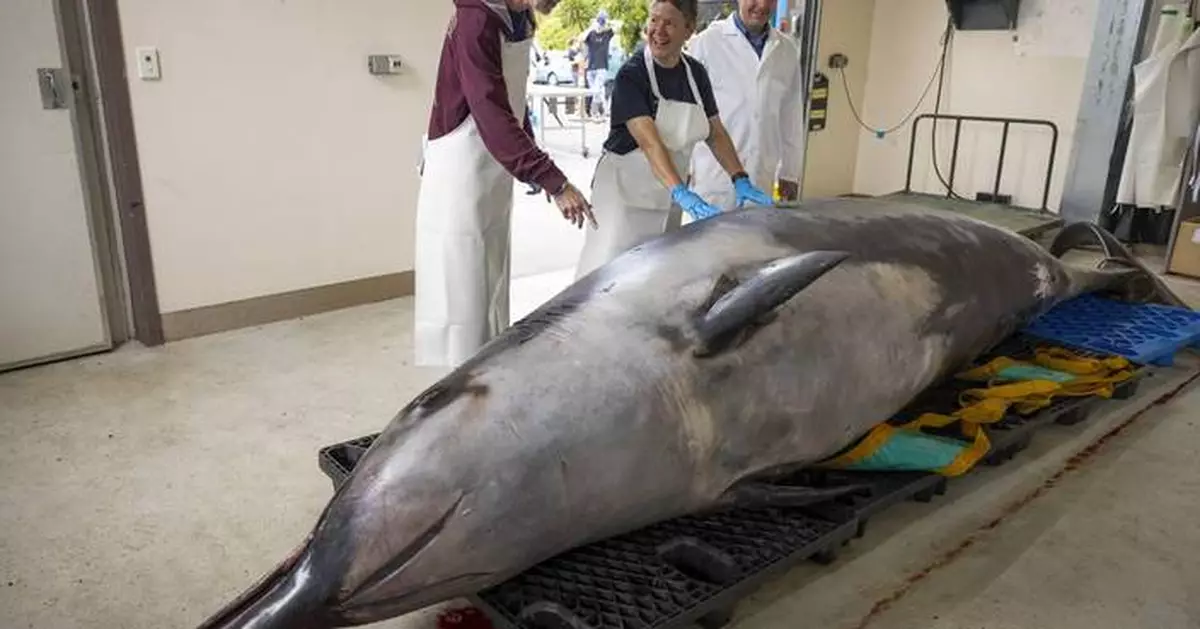WELLINGTON, New Zealand (AP) — It is the world’s rarest whale, with only seven of its kind ever spotted. Almost nothing is known about the enigmatic species. But on Monday a small group of scientists and cultural experts in New Zealand clustered around a near-perfectly preserved spade-toothed whale hoping to decode decades of mystery.
“I can’t tell you how extraordinary it is,” said a joyful Anton van Helden, senior marine science adviser for New Zealand’s conservation agency, who gave the spade-toothed whale its name to distinguish it from other beaked species. “For me personally, it’s unbelievable.”
Click to Gallery
Oliver Dawson inspects a male spade-toothed whale ahead of a dissection at Invermay Agricultural Centre, Mosgiel, near Dunedin, New Zealand, Monday, Dec. 2, 2024. (AP Photo/Derek Morrison)
International scientists, Alexander Werth, from left, professor Joy Reidenberg and Michael Denk study a male spade-toothed whale ahead of a dissection at Invermay Agricultural Centre, Mosgiel, near Dunedin, New Zealand, Monday, Dec. 2, 2024. (AP Photo/Derek Morrison)
A male spade-toothed whale is seen ahead of a dissection at Invermay Agricultural Centre, Mosgiel, near Dunedin, New Zealand, Monday, Dec. 2, 2024. (AP Photo/Derek Morrison)
Beaked whale expert Anton van Helden inspects a male spade-toothed whale ahead of a dissection at Invermay Agricultural Centre, Mosgiel, near Dunedin, New Zealand, Monday, Dec. 2, 2024 (AP Photo/Derek Morrison)
Local "iwi," or people, from a local Māori tribe study a male spade-toothed whale ahead of a dissection at Invermay Agricultural Centre, Mosgiel, near Dunedin, New Zealand, Monday, Dec. 2, 2024. (AP Photo/Derek Morrison)
International scientist's, Alexander Werth, from left, professor Joy Reidenberg and Michael Denk study a male spade-toothed whale ahead of a dissection at Invermay Agricultural Centre, Mosgiel, near Dunedin, New Zealand, Monday, Dec. 2, 2024. (AP Photo/Derek Morrison)
Van Helden has studied beaked whales for 35 years, but Monday was the first time he has participated in a dissection of the spade-toothed variety. In fact, the careful study of the creature -- which washed up dead on a New Zealand beach in July — is the first ever to take place.
None has ever been seen alive at sea.
The list of what scientists don’t know about spade-toothed whales is longer than what they do know. They don’t know where in the ocean the whales live, why they’ve never been spotted in the wild, or what their brains look like. All beaked whales have different stomach systems and researchers don’t know how the spade-toothed kind processes its food. They don’t know how this one died.
Over the next week, researchers studying the 5-meter (16-foot) -long male at an agricultural research center near the city of Dunedin hope to find out.
“There may be parasites completely new to science that just live in this whale,” said van Helden, who thrilled at the chance of learning how the species produces sound and what it eats. “Who knows what we’ll discover?”
Only six other spade-toothed whales have ever been found, but all those discovered intact were buried before DNA testing could verify their identification.
New Zealand is a whale-stranding hotspot, with more than 5,000 episodes recorded since 1840, according to the Department of Conservation. The first spade-toothed whale bones were found in 1872 on New Zealand’s Pitt Island. Another discovery was made at an offshore island in the 1950s, and the bones of a third were found on Chile’s Robinson Crusoe Island in 1986.
DNA sequencing in 2002 proved that all three specimens were of the same species — and that it was distinct from other beaked whales. But researchers studying the mammal couldn’t confirm whether the species was extinct until 2010, when two whole spade-toothed whales, both dead, washed up on a New Zealand beach. But none has been studied before.
On Monday, the seventh of its kind, surrounded by white-aproned scientists who were measuring and photographing, appeared relatively unblemished, giving no clue about its death. Researchers pointed out marks from cookiecutter sharks — normal, they said, and not the cause.
The dissection will be quiet, methodical and slower than usual, because it is being undertaken in partnership with Māori, New Zealand's Indigenous people. To Māori, whales are a taonga -– a precious treasure -– and the creature will be treated with the reverence afforded to an ancestor.
Members of the local iwi, or tribe, will be present throughout the dissection and consulted at each turn, allowing them to share traditional knowledge and observe customs, such as saying a karakia -– a prayer -– over the creature before the study begins.
“According to our beliefs and our traditions, this whale is a gift of Tangaroa, deity of the ocean,” said Tumai Cassidy from the local people Te Rūnanga Ōtākou. “It’s very important for us to respect that gift and to honor the whale.”
The iwi will keep the jawbone and teeth of the whale at the end of the dissection, before its skeleton is displayed in a museum. 3D printing will be used to replicate those parts, using a CT scan taken of the whale’s head this week.
“It all builds a richer picture for that species but also tells us how it interacts with our oceans,” Cassidy said.
It’s thought that spade-toothed whales live in the vast Southern Pacific Ocean, home to some of the world’s deepest ocean trenches. Beaked whales are the ocean's deepest divers for food, and the spade-toothed may rarely surface, adding to its mystery.
The assembled scientists on Monday included a few who had traveled from abroad to see the whale, which was put in refrigerated storage after its discovery.
“What we are interested in is not only how these animals died, but how they lived,” said Joy Reidenberg, a comparative anatomist from the Icahn School of Medicine at Mount Sinai in New York. “In discovering how they live, we are hoping to find discoveries that we can apply back to the human condition.”
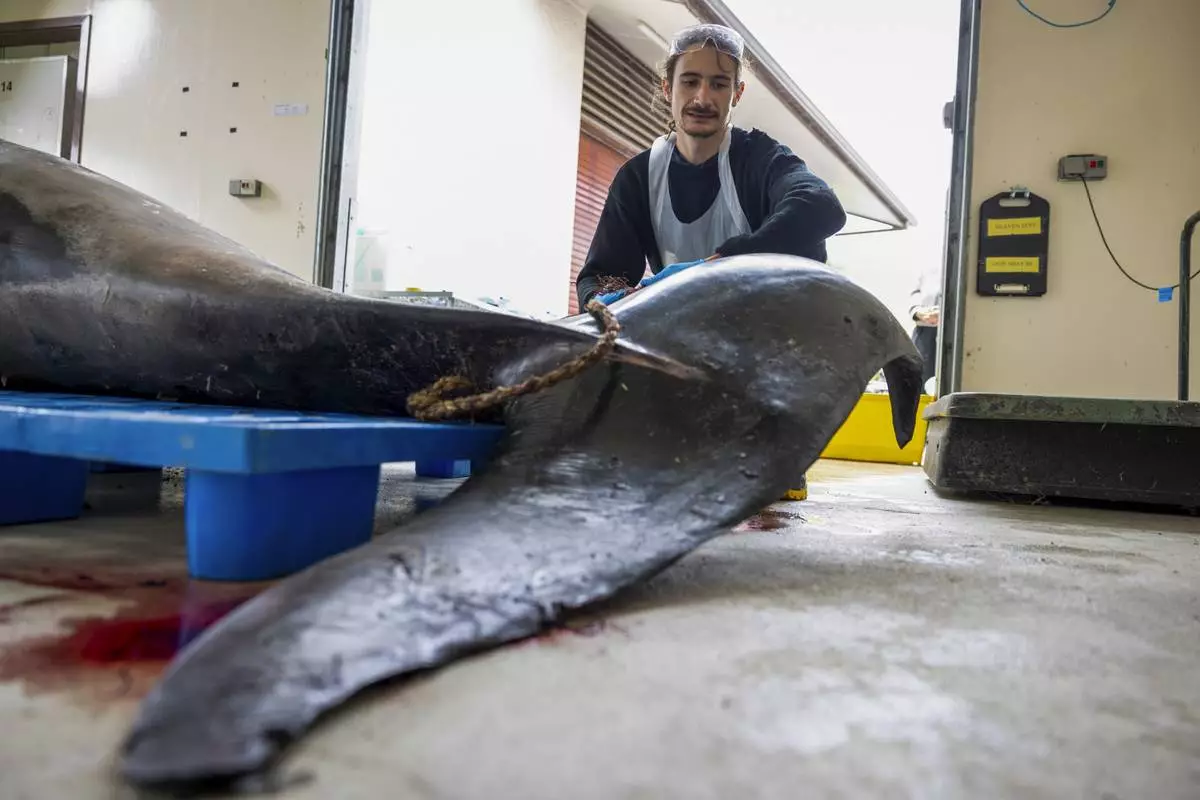
Oliver Dawson inspects a male spade-toothed whale ahead of a dissection at Invermay Agricultural Centre, Mosgiel, near Dunedin, New Zealand, Monday, Dec. 2, 2024. (AP Photo/Derek Morrison)
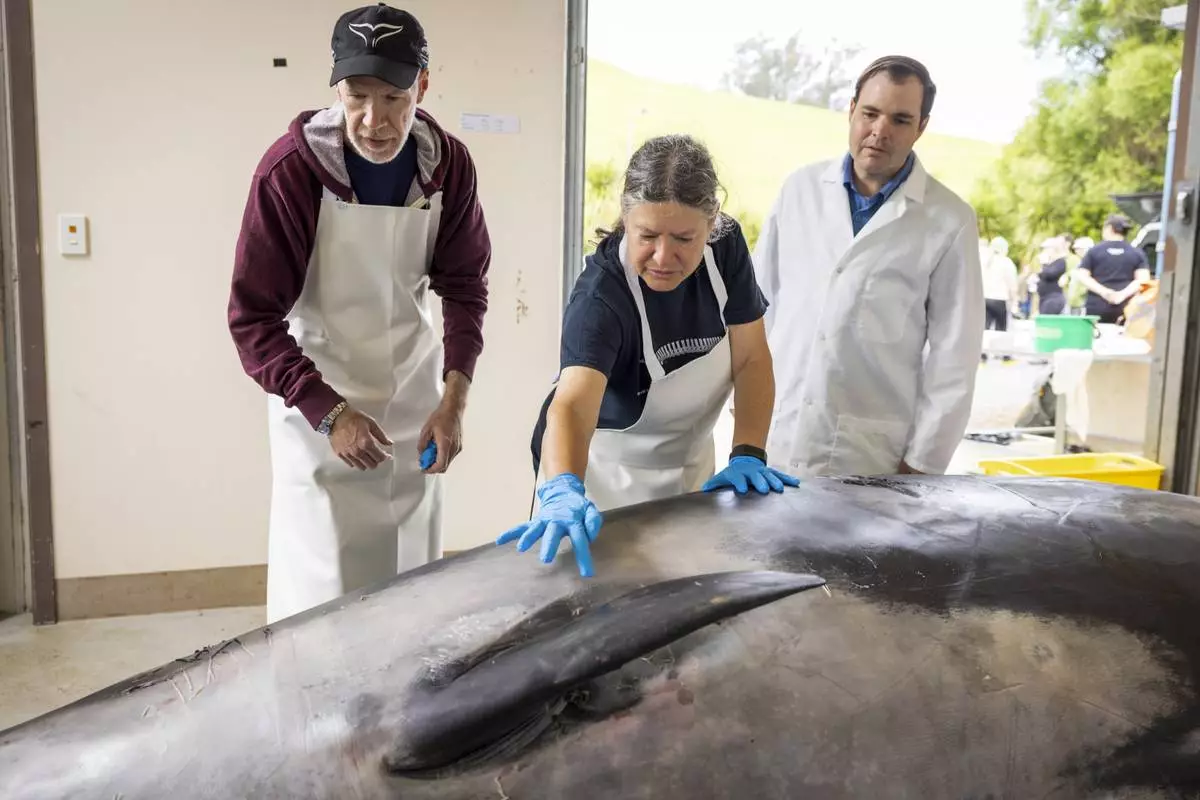
International scientists, Alexander Werth, from left, professor Joy Reidenberg and Michael Denk study a male spade-toothed whale ahead of a dissection at Invermay Agricultural Centre, Mosgiel, near Dunedin, New Zealand, Monday, Dec. 2, 2024. (AP Photo/Derek Morrison)
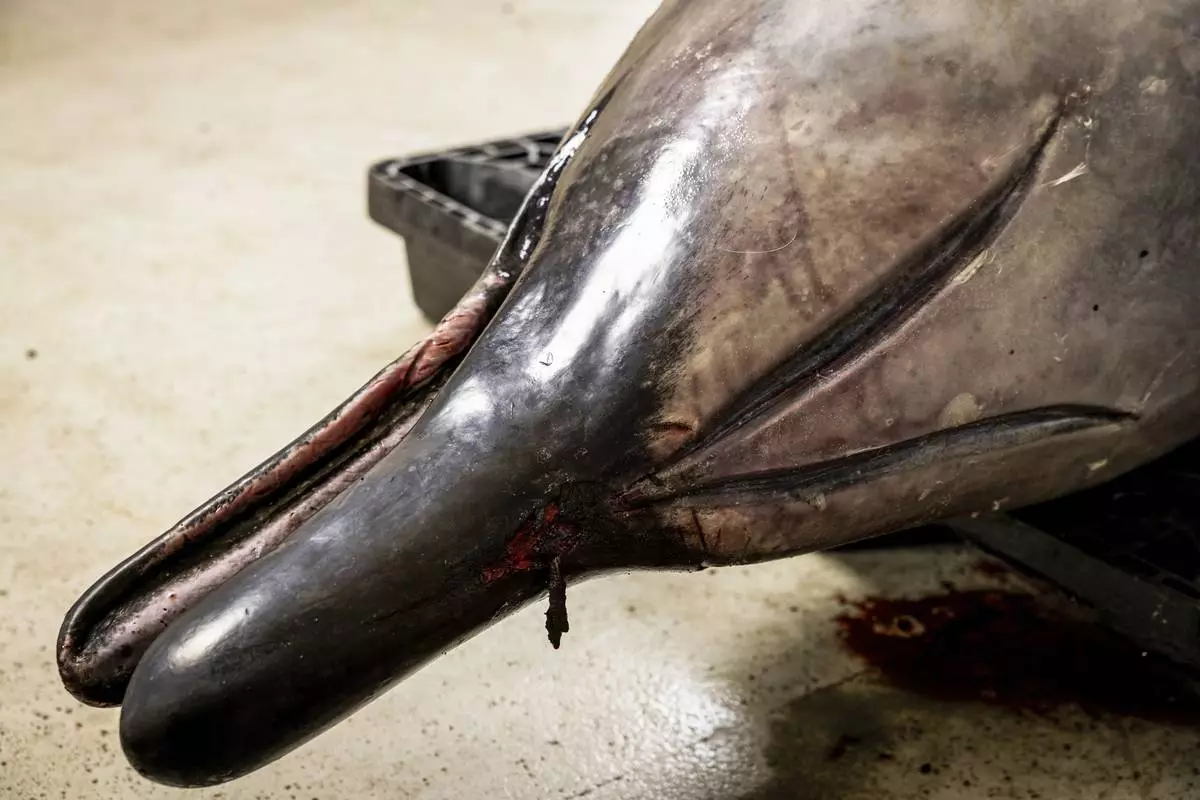
A male spade-toothed whale is seen ahead of a dissection at Invermay Agricultural Centre, Mosgiel, near Dunedin, New Zealand, Monday, Dec. 2, 2024. (AP Photo/Derek Morrison)
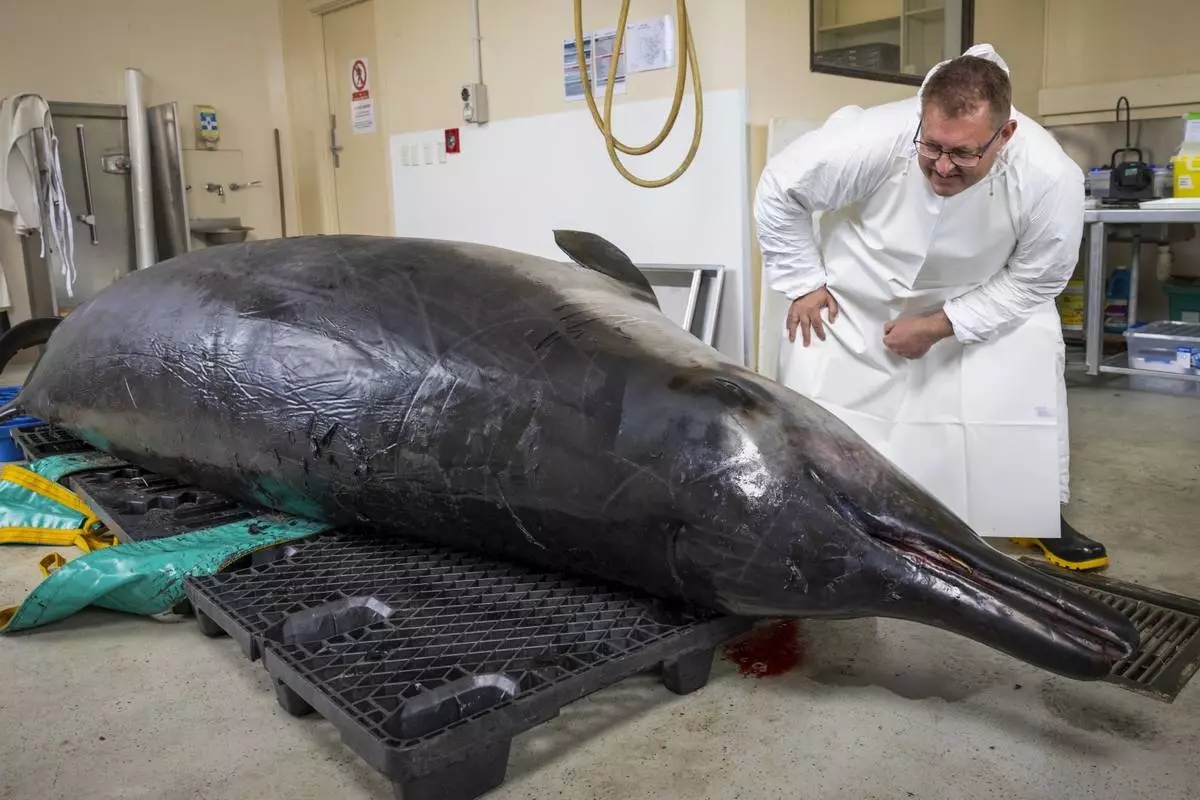
Beaked whale expert Anton van Helden inspects a male spade-toothed whale ahead of a dissection at Invermay Agricultural Centre, Mosgiel, near Dunedin, New Zealand, Monday, Dec. 2, 2024 (AP Photo/Derek Morrison)
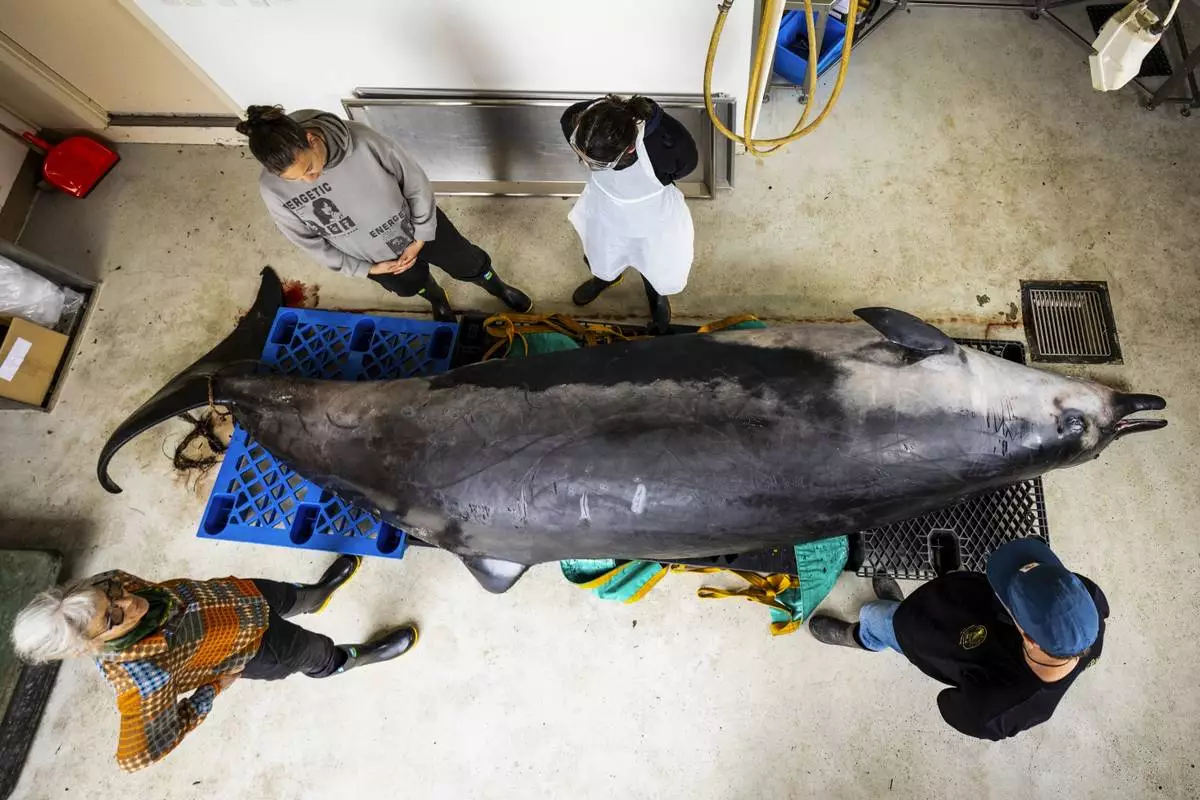
Local "iwi," or people, from a local Māori tribe study a male spade-toothed whale ahead of a dissection at Invermay Agricultural Centre, Mosgiel, near Dunedin, New Zealand, Monday, Dec. 2, 2024. (AP Photo/Derek Morrison)
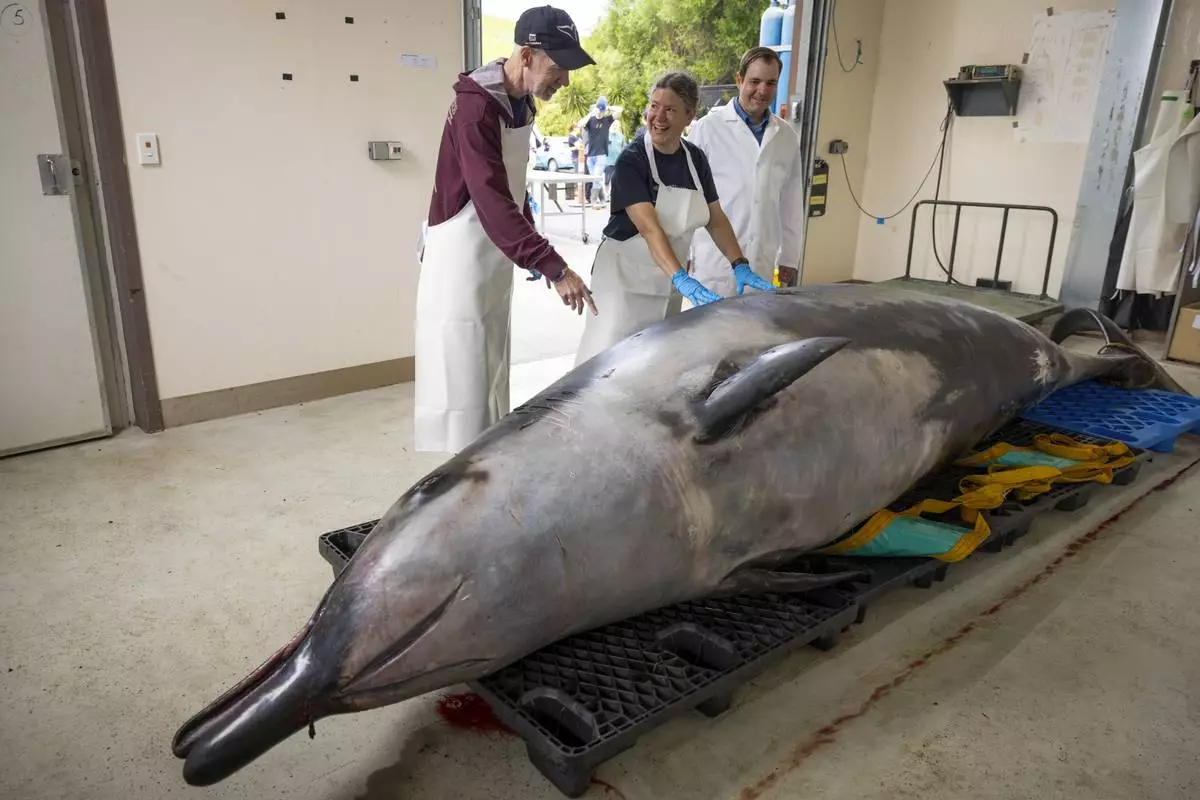
International scientist's, Alexander Werth, from left, professor Joy Reidenberg and Michael Denk study a male spade-toothed whale ahead of a dissection at Invermay Agricultural Centre, Mosgiel, near Dunedin, New Zealand, Monday, Dec. 2, 2024. (AP Photo/Derek Morrison)
LONDON--(BUSINESS WIRE)--Dec 2, 2024--
Curzon today announces the appointment of Philip Knatchbull as Interim Executive Chairman.
This press release features multimedia. View the full release here: https://www.businesswire.com/news/home/20241202236821/en/
“I’m very excited about the next stage of the Curzon journey and am looking forward to reuniting with so many of my colleagues in this new role,” said Philip Knatchbull. “I spent almost 18 years building Curzon to be the hugely respected brand it is now. I trust the team I assembled, and know the company and the industry incredibly well. I return during a pivotal moment for the industry with full confidence in Curzon’s ability to be a strategic and cultural leader."
“Leadership is deeply rooted in Curzon’s history – from being one of the first cinema companies to import European and world cinema in the 1930s, to being among the first global film companies to identify the growing influence of streaming platforms and new production studios. During my tenure as CEO, we forged relationships with many of the industry’s then-new entrants, many of whom have continued to grow their impact on every part of the industry. Together with our long-standing relationships with established studios and distributors, these relationships are a testament to Curzon’s enduring quality in-cinema experience, and our trusted curatorial voice, across development, production, distribution, exhibition and streaming. With this in mind, I can confidently say that Curzon continues to be hugely influential in the film world. I believe the company has the potential to grow that influence significantly over the coming months and years.”
Philip Knatchbull was CEO of Curzon from May 2006 to November 2023. During his tenure, the company grew from a few locations into a national cinema company with film exhibition, distribution, production, and on-demand streaming services.
In November 2024, Fortress Investment Group announced that funds managed by its affiliates had acquired Curzon, making it an independent UK-based company.
The company operates Curzon Cinemas – with 16 cinemas and 46 total screens across the UK – as well as film distributor Curzon Film, and the Curzon Home Cinema streaming service.
Curzon’s pioneering membership programme integrates cinema and streaming, allowing members to use credits against Curzon Cinema visits or watching films on Curzon Home Cinema. The premium Cult membership tier includes seven tickets a week, discounts across food and beverage and more. Curzon members receive priority booking for events, and personalised recommendations based on their film taste. In the past year Curzon has collaborated with Kia, Beronia and Butchers on integrated partnerships that enhance the cinema experience with offerings that include wine tasting screenings, in-person Q&As, and repertory film screenings.
Curzon’s curatorial approach extends to editorial forums and communications, with monthly and weekly newsletters, an online and biannual printed journal, and online video content series ‘Conversations at Curzon’. Curzon has a longstanding relationship with Netflix to exhibit the best of their films in their cinemas.
Curzon Film, which in 2020 set a new UK foreign-language box office record with Parasite (over £12 million at the UK and Irish box-office), has had notable successes in the past year, including:
Curzon Film has released more Cannes Palme d’Or winners than any other UK distributor and has distributed multiple Academy Awards and BAFTA winners, including Best Picture winner Parasite. In 2017, Curzon received a BAFTA in recognition of its Outstanding Contribution to British Cinema.
Curzon Film’s forthcoming slate includes Flow( release date: 21 March 2025)and Julie Keeps Quiet (release date: 7 March 2025) - critically acclaimed hits which have been selected to represent Latvia and Belgium respectively at the Oscars.
Additionally, Curzon is partnering with Amazon MGM on the theatrical release of three of their forthcoming titles:
Curzon has opened new cinema locations in the past several years, including Hoxton, Camden, Kingston-upon-Thames (which features a rooftop bar with panoramic views of the historic riverside town) and Canterbury. Today, Curzon has destination venues across London and around the UK.
About Curzon
Curzon is a multifaceted film company covering exhibition, distribution, production, and on-demand streaming. The company currently operates 16 cinemas across the UK. The distribution business, encompassing Curzon Film and specialist label Artificial Eye, has nearly 50 years of experience in independent film, with a library of critically acclaimed films by some of the world’s greatest directors including Wim Wenders, Michael Haneke, Bong Joon Ho Alice Rohrwacher, and Ruben Östlund. Streaming service Curzon Home Cinema is available to customers through TV, mobile apps, and over-the-top platforms. For more information please visit www.curzon.com.


Philip Knatchbull, Interim Executive Chairman of Curzon (Photo: Business Wire)








